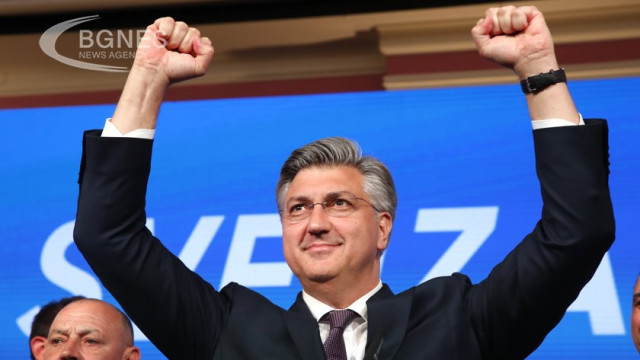Croatia's ruling conservative party won the most seats in Wednesday's parliamentary elections, but not enough to form a government, according to almost complete official results, AFP reports.
The Croatian Democratic Community (HDZ) of current Prime Minister Andrej Plenkovic won 60 seats in the 151-member assembly, results from more than 90 percent of polling stations show. In the previous election in 2020, the party won 66 seats. A center-left coalition led by the Social Democrats (SPD) won 42.
"The CDU has won a parliamentary election convincingly for the third (consecutive) time," Plenkovic told supporters in Zagreb early on Thursday. The party will start forming a new parliamentary majority to form its government on Thursday morning, he added.
SPD leader Pedja Grbin admitted the results were not what the party wanted but said they "show that... people want change".
The nationalist right-wing Homeland Movement party was third with 14 seats. Analysts estimate that it has great communication potential that could make it a key factor in forming a new government. The Ultraconservative Party and the Green-Left Party won 11 and 10 seats each. "It will be a very difficult negotiation process" to form a new government, political analyst Tihomir Cipek told Nova TV.
High voter turnout
Turnout was 60%, compared with 47% during the 2020 vote. The election came after a bitter campaign between Plenkovic and populist leftist President Zoran Milanovic, who campaigned despite a judicial warning. The clash came as the European Union country battles corruption, labor shortages, the eurozone's highest inflation and illegal migration. For months, Plenkovic and his CDU looked poised for an easy victory that would secure his third term as prime minister.
But in mid-March, Milanovic, who was topping political popularity polls, made the shocking announcement that he would challenge Plenkovic and become the Social Democrats' candidate. The Croatian presidency is largely a ceremonial post for a man with no political affiliation. Calling Plenkovic the "godfather of crime", the 57-year-old Milanovic highlighted the recent appointment of a new attorney general who is a judge with alleged links to corruption suspects. Corruption has long been the Achilles heel of the HDP. Several of Plenkovic's ministers have resigned following indictments and the fight against corruption was key to Croatia's EU accession bid in 2013.
Pro-Russian
Milanovic campaigned around the country despite the country's Supreme Court ruling that he could only run in the election if he first stepped down from the presidency. Plenkovic, who has been prime minister since 2016, accused his rival of violating the constitution, engaging in hate speech and called him a "coward" for not resigning. The prime minister highlighted his role in the admission of the country of 3.8 million people to the eurozone and the Schengen area last year. But with an average monthly wage of 1,240 euros ($1,345), the country remains one of the poorest in the EU.
"The global security situation has never been more tense and more dangerous ... so we have to have very responsible people governing Croatia for the next four years," Plenkovic, 54, said after the vote in Zagreb. Plenkovic has repeatedly accused Milanovic of being "pro-Russian" over his criticism of EU support for Ukraine against Moscow's invasion and the president's resistance to training Ukrainian soldiers in NATO-member Croatia. Milanovic, who has condemned Russia's campaign in Ukraine, says he is protecting Croatian interests by preventing the country from being "dragged into a war".
The HDZ has ruled Croatia for most of the period since its independence from Yugoslavia in 1991, while the SPD has been the opposition's mainstay. Milanovic, who was prime minister from 2011 to 2016, is known for his fiery rhetoric and profanity against HDZ opponents, EU officials and its critics. His term expires in January, but he has said he will step down if the SPD and its allies secure a majority to form a new government. / BGNES

